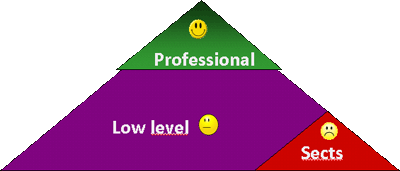
VQC 1.01 Wiener Qualitätscheckliste
für Coachingausbildungen
» german version
« back
Preamble
NLP trainings are offered in Central Europe since around 1982.
As NLP is part of practical psychology, one can say it is always “working with one’s mind”. Until 1990 in Europe NLP trainings were mainly arranged by psychotherapists. Unfortunately many people with a personality (disorder), who failed in their profession, used the American ideas of "parareligious hypnotic show - business" and "making money quick". They extolled a few handy parts of NLP as manipulating instruments to fascinate big groups and made big bucks. This - beside political accusations - has discredited NLP. Many different sect like groups and charlatans developed with only very few reputable providers left over.
"One can successfully complete a course within 10 days". It’s
only about communication. With this often presented argument naïve customers
are caught.
Beyond every "change work" and every personal matter one can find
a human being, having feelings, needs and a history behind.
To handle this respectable in the training, the trainer needs specialized knowledge,
education, experience, supervision and the ability to reflect himself.
Very often the trick "We anyway are only working with healthy people" is used to prevent professional criticism and concerns - well …
a. a plastic surgeon requires a fully completed professional education in surgery,
also for healthy patients.
b. most people who call themselves "specialists in communication"
and also NLP-trainers with so called "NLP trainer certificates" are
not in the position to diagnose the boundary to a disorder
Explanation of terms
"Main trainers" are NLP trainers, who have
A. at least completed 150 days of NLP-training and a comprehensible training qualification. The best comparable level is the Austrian Confederation for professional NLP or the European Association for Neuro-Linguistic Psychotherapy. The German Association for NLP or the Austrian umbrella organisation for NLP requires a very low standard; unfortunately you have to be careful with NLP diplomas from the U.S.

and
B. professionally seen: at least the status of a
1. counsellor or coach entitled to do trainings and supervisions. They also
have to have graduated the psychotherapeutic propaedeutic and the qualification
of a mediator.
2. clinical psychologist or psychotherapist (ECP) and mediator.
3. MD with the right to practice and at least a diploma in psychosomatic medicine
and the qualification of a mediator.
4. management consultant (certified management consultant), qualifications of
a mediator and the psychotherapeutic propaedeutic
5. medical consultant in psychiatry or youth psychiatry and a teaching assignment
for NLPt (Neuro-Linguistic Psychotherapy)
6. comprehensible equal level with foreign trainers
Each main trainer should at least perform 10 % or maximum 25 % of the whole course (course duration: 80 to 90 days).
Evaluation
less than 59 points: not advisable ![]()
![]()
![]()
60 - 120 points: risky ![]()
120 - 180 points: ok ![]()
![]()
180 - 250 points: top quality ![]()
![]()
![]()
![]()